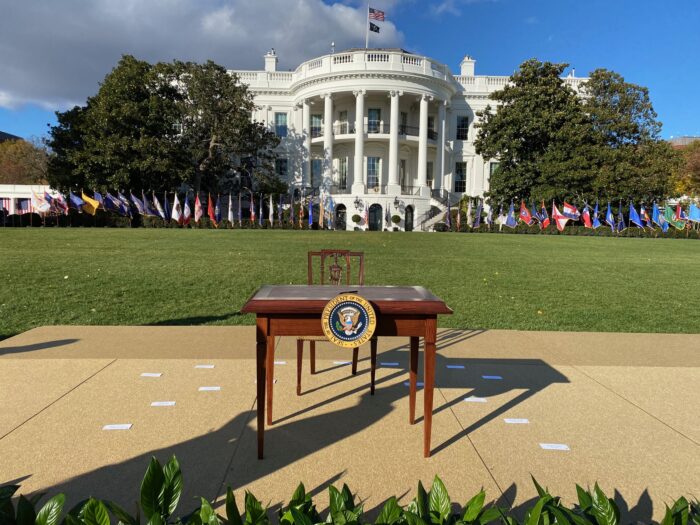 On Monday, November 14, NCBA CLUSA President and CEO Doug O’Brien joined policymakers and stakeholders at the White House to witness President Joe Biden sign the bipartisan Infrastructure Investment and Jobs Act into law.
On Monday, November 14, NCBA CLUSA President and CEO Doug O’Brien joined policymakers and stakeholders at the White House to witness President Joe Biden sign the bipartisan Infrastructure Investment and Jobs Act into law.
This historic investment addresses decades of needed repairs to America’s physical infrastructure, providing $1.2 trillion in federal funds. In addition to roads, bridges, ports, and railways, which is critical to ensuring co-ops can get their goods to market, this legislation also makes significant investments in renewable energy, energy resilience and electric vehicle charging networks, in which electric cooperatives will play an important role.
“Cooperatives have been used for generations to solve big challenges, and this legislation shows that co-ops remain a trusted partner to drive local solutions that promote inclusive and sustainable development. I was honored to help celebrate the signing of this historic bipartisan infrastructure bill and look forward to continuing our working with the Administration as these programs are implemented.”
The new law also includes a $65 billion investment to expand broadband access, including more than $40 billion in grants administered by states. The COVID-19 pandemic demonstrated just how critical affordable, reliable broadband is to capturing educational, health, and economic opportunity. NCBA CLUSA is proud to be a member of the American Connection Project Policy Coalition, spearheaded by Land O’Lakes cooperative, who applauded the inclusion of robust broadband funding. Broadband funding will be essential to closing the digital divide and ensure that people can access opportunity regardless of geography.
The legislation was also supported by the National Rural Electric Cooperative Association (NRECA). NRECA CEO Jim Matheson stated, “This bipartisan bill provides a significant down payment toward meeting critical needs of electric cooperatives and the communities we serve, including funding for priorities such as broadband deployment and electric vehicle charging,” he continued, “This bill recognizes the need to expand these two technologies in rural communities. As policymakers plan for a future that depends on electricity to drive the economy, more work will be needed to build on the groundwork laid by this legislation.”
You can read more details from the White House on what is included in this legislation here.


